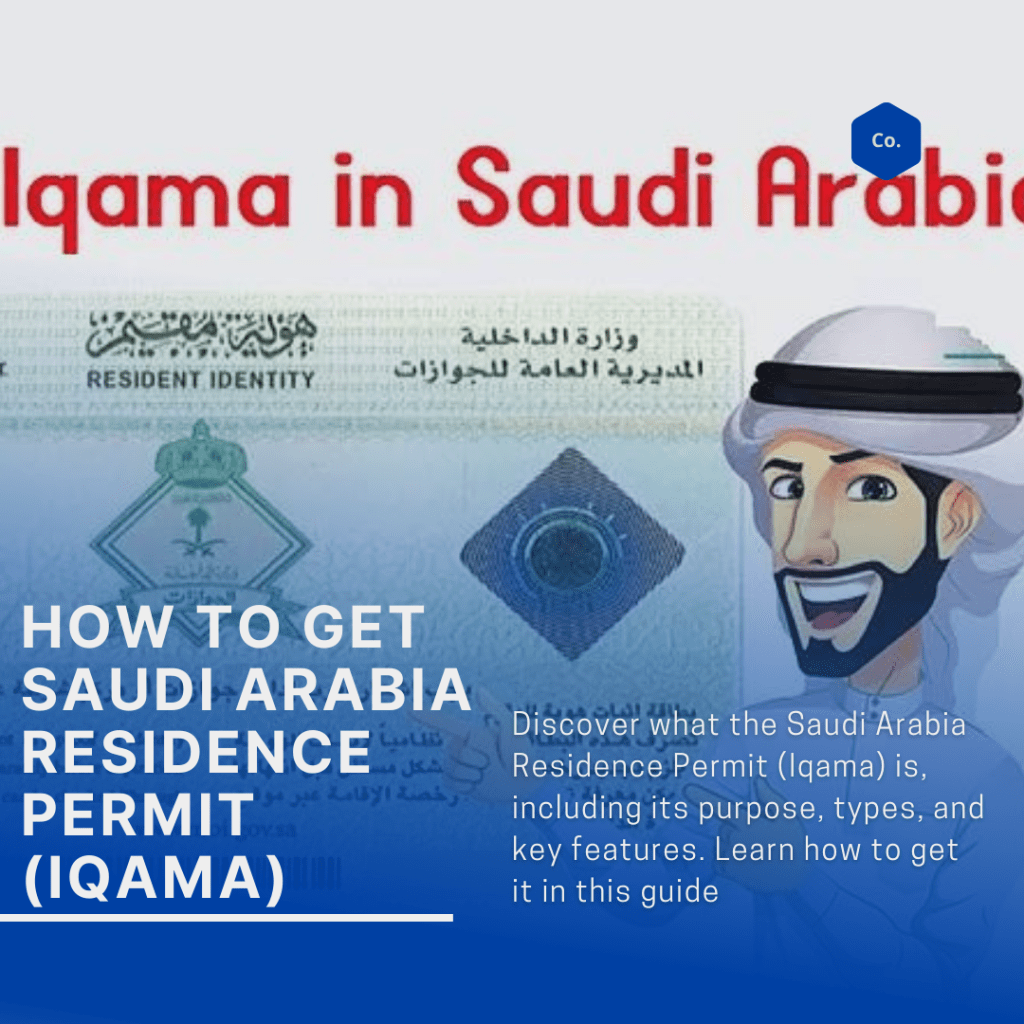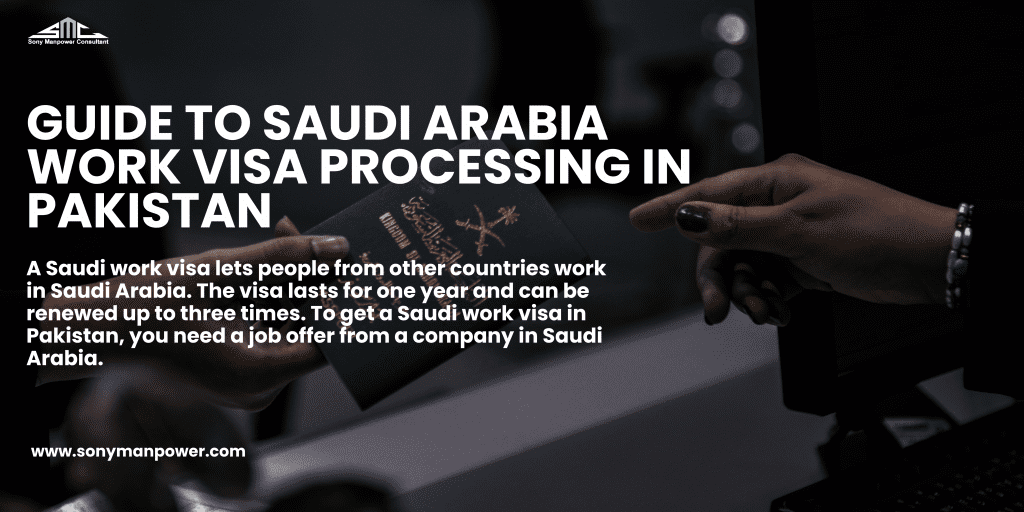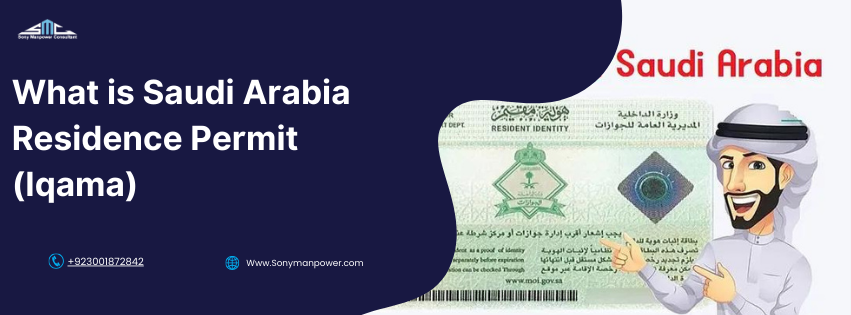What is Saudi Arabia Resident Identity Card (Iqama)

Iqama in Saudi Arabia: Complete Guide to Saudi Residence Permit If you are planning to live or work in Saudi Arabia, understanding the Iqama in Saudi Arabia is essential. The Iqama is more than just an ID card — it is your legal residence permit, work authorization, and access key to services in the Kingdom. This detailed guide explains: What is Iqama in Saudi Arabia Purpose of Saudi Residence Permit Types of Iqama Benefits of Iqama Who needs it How to check Iqama number Special Privileged Iqama (Green Card) Legal rules and penalties FAQs What is Iqama in Saudi Arabia? An Iqama (Saudi residence permit) is an official identity card issued by the Ministry of Interior through the Jawazat. It serves as: Proof of legal residency Work authorization National ID for expatriates Access the document for government services Without a valid Iqama, a foreign national cannot legally live or work in Saudi Arabia. What is the Purpose of Iqama in Saudi Arabia? The Saudi residence permit has several key purposes: 1. Legal Employment The Iqama confirms your employment status under a registered sponsor. 2. Immigration Compliance It ensures compliance with Saudi labor and residency laws. 3. Access to Services Required for: Opening a bank account Getting SIM card Renting property Receiving healthcare School admissions Driving license 4. Travel Authorization Iqama holders can apply for exit/re-entry visas via the Absher portal. If you need help with the Iqama (residence permit) process, consider the services of Sony ManPower Recruitment. They can provide valuable assistance in navigating the complexities of Saudi Arabia’s residency system. What Are the Benefits of Iqama in Saudi Arabia? Holding a valid Iqama provides several advantages: 1. Legal Residency You are legally allowed to stay in Saudi Arabia. 2. Employment Rights You can work under your registered profession. 3. Family Sponsorship You can sponsor: Spouse Children Parents (in some cases) 4. Banking & Financial Access You can: Open bank accounts Apply for loans Use digital payment systems 5. Healthcare & Insurance Access to government or employer-provided medical services. 6. Business Opportunities Eligible expatriates can register businesses under Saudi regulations. 7. Travel Convenience Apply for exit and re-entry permits without separate visas for each trip. Who Needs Iqama (residence Permit) in Saudi Arabia? You must obtain an Iqama if: You are working in Saudi Arabia You plan to stay more than 90 days You are sponsoring family members You are starting a business in the Kingdom Even dependents (spouse and children) must have their own Iqama. How to find the iqama number by passport number If you need to check your Iqama number: Method 1: Through Absher Visit the Absher website Log in to your account Go to “Query Iqama Status” Enter passport number Submit details Your Iqama number will appear if the records match. Method 2: Visit Jawazat Office Go to your nearest Jawazat branch with your passport for assistance. How Many Types of Iqama (Residence Permits) in Saudi Arabia? Saudi Arabia offers several types of Iqama to meet the diverse needs of expatriates: Domestic Worker Iqama: Issued to individuals employed as domestic workers, such as maids, drivers, and cooks. Labor Class Iqama: For expatriates working in lower-skilled labor positions. Professional Class Iqama: Designed for individuals in specialized or professional roles. Dependents Iqama: Granted to family members of expatriates, allowing them to reside in Saudi Arabia. Government Employees Iqama: Issued to expatriates working in government positions. Business Iqama: For expatriates who own or are involved in business operations in a country. Special Privileged Iqama (Green Card): A special residency permit that offers various benefits in Saudi Arabia. Let’s Explore Each Type of Iqama in Detail 1. Domestic Worker Iqama The Domestic Worker Iqama is issued to foreign household employees hired by Saudi citizens. This category includes positions such as housemaids, drivers, nannies, and watchmen. Holders of this Iqama have access to government hospital services. However, they cannot apply for permanent family visas or family visit visas. 2. Labor Class Iqama The Labor Class Iqama is granted to those workers in labor-intensive fields. Such as construction site workers, welders, plumbers, cleaners, and painters. Those with this Iqama receive insurance coverage from their sponsoring companies. 3. Professional Class Iqama Professional Class Iqama is designated for those individuals with professional degrees. Which includes doctors, nurses, engineers, and pharmacists. Professionals in this category working in the private sector receive insurance benefits from their employers. Holders of this Iqama can sponsor family members for visits and permanent stays and are eligible to apply for visas to countries like the UK and the USA. However, they may need to register with specific regulatory authorities in Saudi Arabia depending on their profession. 4. Dependents Iqama The Dependents Iqama is intended for the family members of expatriates or foreign workers. Which resides in Saudi Arabia. To obtain this Iqama, the expatriate must be present in Saudi Arabia under a permanent visa and initiate the application process for their family members. 5. Government Employees Iqama Foreign employees working in the government sector of Saudi Arabia receive the Government Employees Iqama. This permit allows them to access government sector services and sponsor family members for visits or permanent visas without incurring additional dependent fees. 6. Business Iqama The Business Iqama is for individuals who wish to engage in business activities within Saudi Arabia. To obtain this Iqama, applicants must indicate “businessman” as their profession in the application and complete registration with the Saudi Arabian General Investment Authority (SAGIA). 7. Special Privileged Iqama or Green Card The Special Privileged Iqama is often referred to as the Green Card. Offers a unique opportunity for foreign nationals to obtain resident status in Saudi Arabia. This Iqama comes with a one-time fee and an annual renewal cost. In return, it provides access to numerous privileges. Including the ability to secure permanent family visas and work within any organization without needing to transfer sponsorships. Final Thoughts In summary, an Iqama in Saudi Arabia is more than just a residency permit. It plays a
Guide to Saudi Arabia Work Visa Processing in Pakistan

Guide to Saudi Arabia Work Visa Processing in Pakistan A Saudi work visa lets people from other countries work in Saudi Arabia. The visa lasts for one year and can be renewed up to three times. To get a visa in Pakistan, you need a job offer from a company in Saudi Arabia. Your employer will handle the visa application for you. This process can take around two months. Once your visa is approved. You need to go to the Saudi embassy or consulate in Pakistan to get your visa stamped. This can take up to two weeks. After your visa is stamped, you can go to Saudi Arabia and start your job. Recruitment agencies in Pakistan can help you with this whole process. Saudi Work Visa Requirement The requirements for a Saudi work visa depend on the applicant’s nationality. Generally, you will need: You may also need: For more information on the specific requirements for getting a visa, please contact the Saudi Embassy or Consulate in your country. Documents Required: The following documents are required for submission of documents to Saudi Embassy in Islamabad: You can find more information on the specific requirements for a Saudi work permit on the Saudi Embassy website. Stamping Process in Pakistan The application process for a Saudi work permit is as follows: Processing Time for a Saudi Work Visa The time it takes to process a Saudi work permit can differ based on the country you’re applying from. For instance, if you’re applying from Pakistan, it usually takes about 3-4 weeks, while applications from the United States may take around 6-8 weeks. After your visa is approved, you need to book an appointment at the Saudi embassy or consulate in your country to get your visa stamped. The stamping process typically takes 1-2 days, although this can vary by location. Once your visa is stamped, you can travel to Saudi Arabia and start working. Fees for Saudi Work Visa The fees for a Saudi work visa vary depending on the type of visa and the length of stay. For example, the fee for a single-entry work visa is SAR 2,000, while the fee for a multiple-entry work permit is SAR 3,000. The fee for a one-year work visa is SAR 5,000, while the fee for a two-year work visa is SAR 7,000. The fees for a Saudi visa can be paid in cash or by credit card. The fees must be paid in Saudi riyals. Validity of Saudi Work Visa A Saudi work visa is valid for one year and can be renewed for up to two more years, therefore allowing a total maximum validity of three years. To renew your Saudi visa, you need to submit the following documents to the Saudi embassy or consulate in your home country: Hence the processing time for renewing a Saudi visa usually takes about two to three weeks. Extensions of Saudi Work Visa A Saudi work permit can be extended for a maximum of two years. Also to extend your visa, you must submit the following documents to the Saudi embassy or consulate in your home country: The processing time for an extension of a Saudi work visa is typically two to four weeks. Do you want help from Saudi Visa Processing Experts from Pakistan? Get in touch with us right now! Transferring a Saudi Work Visa A Saudi work visa can be transferred to someone else if the original holder dies, becomes unable to work, or loses their job. Here’s how to transfer a Saudi visa: It’s important to remember that transferring a Saudi work visa is not automatic. Hence the original holder needs to make the request, and the new holder must meet all the requirements for a Saudi work visa. Hence this process can take several weeks, so it’s good to plan ahead. More Resources: Top Recruitment Agency In Pakistan For Saudi Arabia
What is Saudi Arabia Resident Identity Card (Iqama)

What is Saudi Arabia Resident Identity Card (Iqama) In Saudi Arabia, the term “Iqama” is very important for expatriates. This article will explain what Iqama is, and look at the different types issued by Saudi authorities. We’ll start with a simple overview of Iqama. Its purpose, and the various kinds available to expatriates living and working in Saudi Arabia. What is Iqama in Saudi Arabia? Iqama(residence permit) is an identity card issued by the Saudi government. That acts as a residency permit for expatriates living in the Kingdom of Saudi Arabia (KSA). Although It is closely linked to a sponsor, typically an employer, and serves as proof of legal residency. The Iqama allows expatriates to access various services and benefits in the country. Obtaining an Iqama can be complex. What is the Purpose of Iqama in Saudi Arabia? The Iqama(residence permit) in Saudi Arabia serves several key purposes. It is your official identification card and proof of legal residency. Primarily, it is essential for lawful employment. Showing your connection to a local sponsor and functioning as both your residence and work permit. This crucial document ensures you comply with immigration and work regulations. Providing a clear framework for expatriate employment in the Kingdom. If you need help with the Iqama (residence permit) process, consider the services of Sony ManPower Recruitment. They can provide valuable assistance in navigating the complexities of Saudi Arabia’s residency system. What Are the Benefits of Iqama in Saudi Arabia? Business Opportunities The Iqama( residence Permit) provides expatriates with the ability to establish and manage companies in Saudi Arabia while complying with foreign investment regulations. This facilitates entrepreneurial ventures and supports economic growth among expatriates. Travel Freedom With an Iqama, expatriates enjoy the freedom to enter and exit Saudi Arabia without needing a separate visa for each visit. This streamlined travel process enhances overall convenience and efficiency for residents. Family Visits The Iqama also allows expatriates to apply for visitor visas for family members, making it easier to facilitate family reunions and maintain close connections with loved ones. Active Participation in the Saudi Economy Aligning with Saudi Arabia’s Vision 2030, the Iqama integrates expatriates as integral contributors to the Saudi economy. It helps boost consumption by improving purchasing power, promotes economic activity across various sectors, supports the growth of small and medium enterprises, and creates job opportunities for Saudi citizens. Legal Framework and Consequences The Iqama operates within a legal framework that emphasizes accountability, requiring adherence to specific conditions. Non-compliance with these conditions can lead to the cancellation of the permit. Reasons for cancellation include providing false information, criminal convictions, or deportation orders, ensuring a transparent and lawful process. Who Needs Iqama (residence Permit) in Saudi Arabia? If you are planning to move to Saudi Arabia with your family, obtaining an Iqama is the first step, as it allows you to sponsor your spouse and/or children. For anyone moving to Saudi Arabia or staying for more than 90 days, an Iqama or Saudi ID Card is required. This card is essential for expatriates as it confirms their legal residency and provides access to various services and benefits within the country. If you plan to live and work in Saudi Arabia, having an Iqama or updating your iqama is crucial. How to find the iqama number by passport number Visit Absher Portal: Go to Absher.sa and log in. Navigate to Services: Find the option to query Iqama status. Enter Passport Number: Input your passport number and submit. View Iqama Number: Your Iqama number should appear if the details are correct. Alternatively, visit a Passport office (Jawazat) in Saudi Arabia with your passport for assistance. How Many Types of Iqama (Residence Permits) in Saudi Arabia? Saudi Arabia offers several types of Iqama to meet the diverse needs of expatriates: Domestic Worker Iqama: Issued to individuals employed as domestic workers, such as maids, drivers, and cooks. Labor Class Iqama: For expatriates working in lower-skilled labor positions. Professional Class Iqama: Designed for individuals in specialized or professional roles. Dependents Iqama: Granted to family members of expatriates, allowing them to reside in Saudi Arabia. Government Employees Iqama: Issued to expatriates working in government positions. Business Iqama: For expatriates who own or are involved in business operations in a country. Special Privileged Iqama (Green Card): A special residency permit that offers various benefits in Saudi Arabia. Let’s Explore Each Type of Iqama in Detail 1. Domestic Worker Iqama The Domestic Worker Iqama is issued to foreign household employees hired by Saudi citizens. This category includes positions such as housemaids, drivers, nannies, and watchmen. Holders of this Iqama have access to government hospital services. However, they cannot apply for permanent family visas or family visit visas. 2. Labor Class Iqama The Labor Class Iqama is granted to those workers in labor-intensive fields. Such as construction site workers, welders, plumbers, cleaners, and painters. Those with this Iqama receive insurance coverage from their sponsoring companies. 3. Professional Class Iqama Professional Class Iqama is designated for those individuals with professional degrees. Which includes doctors, nurses, engineers, and pharmacists. Professionals in this category working in the private sector receive insurance benefits from their employers. Holders of this Iqama can sponsor family members for visits and permanent stays and are eligible to apply for visas to countries like the UK and the USA. However, they may need to register with specific regulatory authorities in Saudi Arabia depending on their profession. 4. Dependents Iqama The Dependents Iqama is intended for the family members of expatriates or foreign workers. Which resides in Saudi Arabia. To obtain this Iqama, the expatriate must be present in Saudi Arabia under a permanent visa and initiate the application process for their family members. 5. Government Employees Iqama Foreign employees working in the government sector of Saudi Arabia receive the Government Employees Iqama. This permit allows them to access government sector services and sponsor family members for visits or permanent visas without incurring additional dependent fees. 6. Business Iqama The Business Iqama is for individuals


